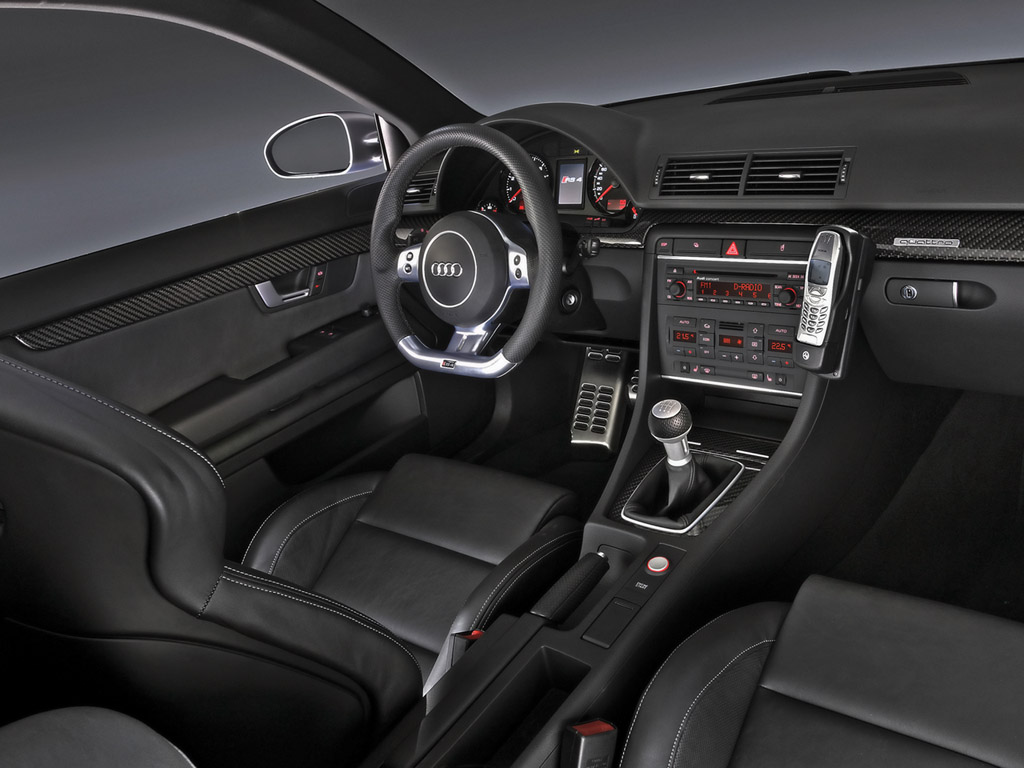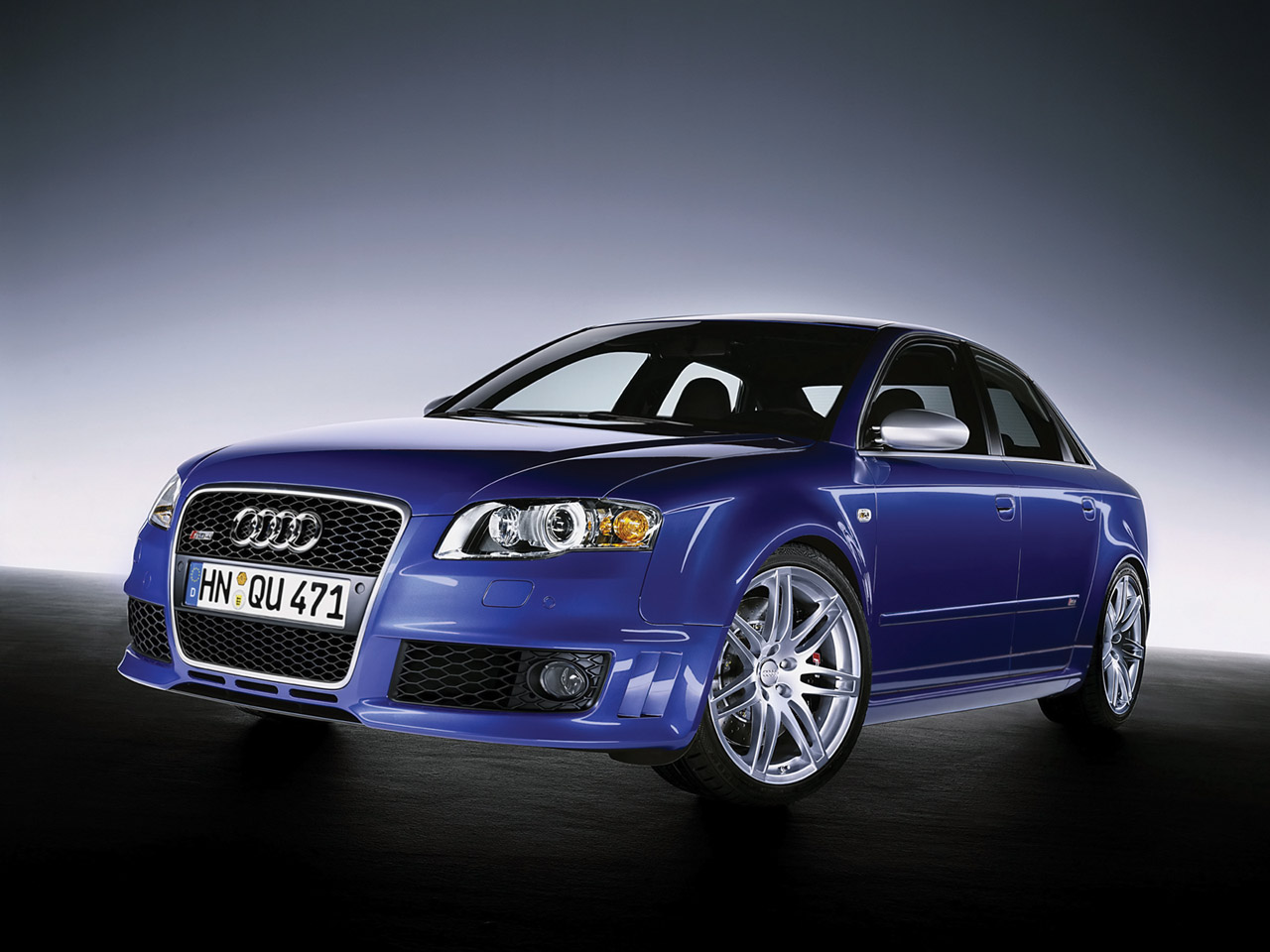2005 Audi RS 4
|
Price |
-- |
Production |
-- | ||
|
Engine |
4.2 liter V8 |
Weight |
3639 lbs | ||
|
Aspiration |
natural |
Torque |
317 lb-ft @ 5500 rpm | ||
|
HP |
420 hp |
HP/Weight |
8.7 lbs per hp | ||
|
HP/Liter |
100 hp per liter |
0-124 mph |
16.6 seconds | ||
|
0-62 mph |
4.8 seconds |
Top Speed |
155 mph (electronically limited) |
(from Audi Press
Release) New dimensions in driving dynamics combined with
innovative ideas and concepts – and, in addition, exciting lines and
a level of equipment living up to even the highest luxury
performance standards: The new Audi RS 4 combines the latest
high-performance motoring qualities offered by quattro GmbH in a
thoroughbred sports saloon with supreme everyday driving qualities
in the premium segment. Indeed, the new RS 4 is the top-of-the-range
model in the A4 series, a development all-new from the ground up.
Numerous technical achievements – many of which hail from motorsport
– give the new Audi RS 4 its unique class and character. These
features include the high engine speed concept now being introduced
for the first time in a production Audi, innovative FSI technology,
as well as the latest generation of quattro drive with
asymmetric/dynamic distribution of torque. Developing a maximum
output of 420 bhp, the V8 revs up to a speed of 8250 rpm. With its
displacement of 4163 cc, this outstanding engine exceeds the magical
barrier of 100 bhp per litre truly outstanding in a production
saloon. Maximum torque of 430 Nm comes at 5500 rpm in this very
compact engine, with 90 per cent of the engine's torque consistently
available between 2250 and 7600 rpm. The result is excellent muscle
and pulling force at all times, enabling the driver whenever he – or
she – wishes to drive in truly relaxed style without frequent gear
changes.
Audi has chosen its trendsetting and groundbreaking FSI technology
for the RS 4 saloon, direct gasoline injection ensuring even more
effective combustion of the fuel/air mixture and, as a result, an
even better power yield. This is matched by the highly responsive
development of power, the RS 4 accelerating to 100 km/h in 4.8
seconds and reaching 200 km/h in 16.6 seconds. Top speed is cut off
electronically at 250 km/h.
Audi's FSI technology has already proven its qualities impressively
in Audi's four-time Le Mans winner, the Audi R8.
A further essential point in the brief given to Audi's development
engineers was to optimise the car's power-to-weight ratio, avoiding
every superfluous gram on the Audi RS 4. Accordingly, virtually
every component was checked and cross-checked for minimum weight.
The front wheel arches and the engine compartment lid are therefore
made of aluminium, just like most components on the chassis and
suspension. The specially designed RS bucket seats, in turn, are not
only very light, but also offer extremely good body support in every
situation.
The result is a power-to-weight ratio of just 3.93 kilos per bhp – a
figure truly reminiscent of a thoroughbred sports car, which would
not even have been conceivČable just a few years ago in a midrange
saloon.
New generation of quattro drive
The challenge, of
course, is to get all this power on to the road in perfect style and
with optimum handling. And for no less than 25 years, Audi's answer
to all the particular requirements in this respect has been that
magical name “quattro”. Now the latest generation of Audi's
permanent four-wheel drive featured for the first time in the RS 4
offers asymmetric/dynamic torque distribution and a self-locking
Torsen centre differential, making a significant contribution in
enabling the RS 4 with its sports suspension to enter new dimensions
in driving dynamics. Indeed, Audi quattro technology still provides
traction when other drive concepts have long reached their limits.
And in this case quattro drive is further enhanced by Audi's DRC
Dynamic Ride Control, significantly reducing both body roll and
dive.
The brakes also enter new dimensions, an 18-inch brake system
ensuring optimum stopping power. The cross-drilled, inner-vented
brake discs at the front measure 365 millimetres in diameter, as
opposed to 324-millimetre brake discs at the rear. Flow-optimised
ventilation geometry incorporating Naca jets on the underfloor of
the car ensures first-class cooling of the brakes under all
conditions.
As a result, brake fading is significantly reduced even under
extreme loads, for example on the race track.
Focusing on the RS 4, quattro GmbH has carefully re-aligned the
latest generation of ESP to the particular properties and features
of this high-performance sports saloon. With the system intervening
later and for a shorter period than on a conventional car, driving
dynamics are improved significantly. The integrated dry braking
function in wet weather, in turn, ensures additional safety on the
road, with the brake pads being unnoticeably placed on the brake
discs at regular intervals in order to dry the brakes for
instantaneous use whenever required.
Design
The RS 4 features racing
technology in civilian clothes. While many of its features look
similar to the new Audi A4, the RS 4 is far more than just a “fast”
derivative of Audi's highly successful midrange saloon. Quite simply
because the car is an almost entirely brand-new development tailored
to the highest performance requirements.
The single-frame radiator grille, the rear section with the
distinctly horizontal orientation of the car's lines, and the side
surfaces with the shoulder line plastically filling in the car's
contours, all prove that the RS 4 is a member of the A4 family.
However, the radiator grille in diamond look, the additional air
intake scoops in the front section, as well as the wheels developed
specifically for the RS 4, clearly set the car aside from a “normal”
Audi A4.
The newly designed rear air dam encompassing two extra-large
tailpipes as well as the discreet but highly effective spoiler
integrated in the luggage compartment lid and the rear side panels
all bear clear testimony to the saloon's dynamic driving potential
also in terms of their looks. Compared with the Audi A4, the entire
body of the car has been lowered by 30 millimetres. And at the same
time the development engineers at quattro GmbH have widened the
car's track both front and rear. At the end of the day, however, all
these modifications to the body of the car are significant not only
in terms of design, but also above all in terms of function.
Inside, the RS 4 combines the straightforward function of a sports
car with the luxurious ambience so typical of all Audi models. The
dominating materials are leather, aluminium, and carbon. But at the
same time the RS 4 comes with all the additional qualities so
typical of a genuine sports car.
This superiority becomes clear immediately when you take your seats
in the car: The RS bucket seats with their high side sections
provide excellent support. A further feature of these bucket seats
is the control button on each seat for inflating the side support
elements adjusting perfectly to the driver's anatomy. The sports
steering wheel tapering down at the bottom and the engine starter
button on the centre console, in turn, are also clearly reminiscent
of motorsport, just like the aluminium pedals.
You start the engine of the Audi RS 4 by pressing the starter button
housed conveniently in the centre console right next to the driver.
Pressing the sports button in the steering wheel, in turn, the
driver is able to modify the gas pedal control map, giving the
engine even sharper and more direct response.
Features and equipment
Driving the Audi RS 4 means driving a sports car without making any concessions. Right from the start, therefore, the RS 4 comes with virtually all the features already boasted by the Audi A4. Apart from a wide range of advanced safety components, this also means high-comfort automatic air conditioning, central locking with remote control, and electric window lifts at the front. Further features of the RS 4 include the acoustic parking system at the front and rear, the Concert radio system, as well as sports suspension with variable damper control (DRC). Furthermore, the purchaser of an Audi RS 4 can also opt for a particularly high standard of comfort amenities such as Audi's navigation system plus or dynamic adaptive light headlights literally guiding the driver round bends in the road.



